This is a Fatty Arbuckle film I’d not seen before. Granted, I’m very unfamiliar with his work, having seen but a few of his shorts in the past, but nonetheless, this isn’t the sort of role I’m familiar with for him. This is one of his earlier films, so perhaps he hadn’t yet gone the fully comedic route, though this short film is a comedy.
The story is simple, at least at first. A married couple is getting dressed for dinner. They’re a wealthy couple, Arbuckle plays a doctor, so I suppose it makes sense that he is putting on his tuxedo for a dinner at home with his wife, played by Mabel Normand, who is also dressed to the nines. The plan is altered by the arrival of a telegram: the wife’s childhood bestie is coming for dinner. She’s elated, Arbuckle less so, especially once he learns they were sweet on each other as children. Despite it being an innocent thing— they were small children at the time— Arbuckle is jealous, and spends the evening keeping them away from one another.
The trio enjoy a decadent dinner, replete with rich, filling foods, the highlight of which are some massive lobsters. Normand remarks that no one will sleep easily after such a sumptuous feast, and no doubt all three would have spent the evening suffering from indigestion had an adventure not broken out in the meantime, for as dinner winds down, and post-prandial digestifs are being consumed, we learn that a couple crooks are casing the house.
One of the would-be robbers pretends to be injured to get inside, but Arbuckle sees through the ruse before the thief can break into his safe, and tosses him out. Undeterred, the robbers call the doctor and tell him he’s needed for an emergency, causing him to speed off to a nonexistent accident. When he gets there and realize he’s been duped, he immediately believes his wife and her friend sent him off so they can be alone together. Instead, they are beset by the robber, who has broken into the house.
From here the film shifts gears, and devolves into a series of chases and pratfalls along the lines of what one expects from a Keystone Cops short, then promptly shifts gears again, this time into much darker territory. Arbuckle returns home just after the robber has been chased away, so he sees his wife and her friend together and assumes the worst. He throws the friend out of a window, but once he lands two stories below the scene shifts to his bed. It seems the friend has dreamt the entire thing. Or has he? We cut back to Arbuckle and Normand. Still blinded by rage, he strangles her then staggers out of the room. Except she’s not dead! She picks up his discarded pistol, follows him out of the room, and shoots him as he is descending the stairs. Arbuckle falls to his death. Except he doesn’t. He, too, wakes up, having fallen asleep in his office chair. He races upstairs to check on his wife, and encounters the friend, who is doing likewise after the apparently shared nightmare.
Together the reminisce about the lobster dinner— those pesky crustaceans!— and share a laugh and a handshake. Friends at last! A fine end to a fine film!
Arbuckle is masterful with his gestures and facial expressions, and comes off as very versatile. He is quite menacing at times, while at others he exudes a boyish charm. He can take a pratfall as easily as he can strangle his wife. Best of all, he never overdoes it, all the while gliding across the screen in a svelte manner that belies his girth.
I watched this on YouTube, and have linked it below so you can enjoy it, too.
Next I’m watching Where Is My Treasure? [1916], directed by Ernst Lubitsch.






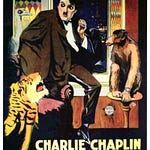
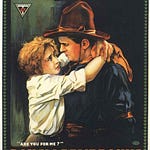
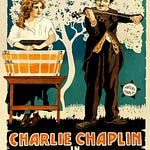

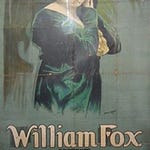
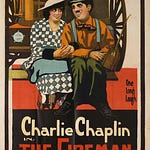

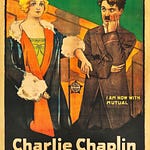
Share this post